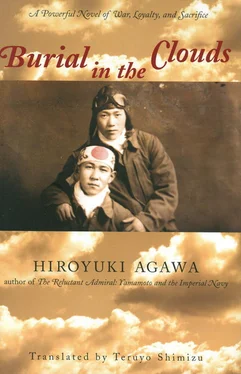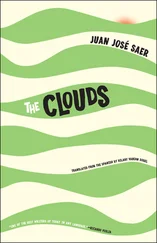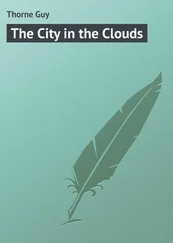It was overcast today. The wind shifted from south to east. The sun peeked out now and then, making it feel like spring. I saw some odd-looking sailboats on Lake Kasumiga-ura, and fresh grass on the opposite bank. In the center of the drill ground four gliders stood neatly arrayed, their wings in alignment.
Our morning lesson was glider training. Once every sixteen turns, I would cry out, “Cadet Yoshino, #39, ground run start,” and then taxi the glider for about twenty seconds. That’s it for now, but the pleasant shock of it all makes me feel as if we really are taking our first steps skyward. In flight lessons the other day, we were allowed to climb into a Junker and, for the first time, get our hands on the control stick. It thrills me to think we are about to tread a path into the clouds. No doubt it is also the path to the grave, but that doesn’t get me down. What’s depressing and annoying are all the daily trivialities.
I was running back from the bath, soap case in my right hand, washcloth in my left, when I came across the assistant division officer. I was bewildered. I stopped and passed the soap case to my left hand in order to make my salute. “You must run!” he barked, and gave me a smack. Blow number nine.
Today, we received a ration of milk for the second time, and it was wonderful after a bath. Octopus showed up at dinner tonight. It was delicious, but nevertheless I just want sweets. When it comes to food, we all snarl at each other like stray dogs. It’s shameful, but we can’t help it. And I find myself equally convinced by two contradictory theses. One holds that military life degrades you, and the other that it ennobles you. Two selves coexist inside me: a “noble” Yoshino, who would discipline his mind to the utmost of his ability, and an animalistic, base Yoshino. “It is evidence of a degraded character,” I once read in a book by a Western philosopher, “to obsess oneself with food, drink, and other affairs of the body.” At the time, I couldn’t have agreed more. I even congratulated myself that, in the light of this philosophy, my own good character shone, but now I know how easily, and how quickly, such half-baked “nobility” crumbles. If anyone who has never undergone the ordeal we are suffering here ever crows these words of philosophy to me, I certainly bite his nose. At a time like this, how can we not obsess over a precious bag of candy?
I experience pleasure when I take a bath, eat a snack, or change my undershirt. I take pleasure in the hum of a lark I noticed while advancing, on all fours, in a trying battle drill. It is a blessing that I find such bliss in insignificant things—things I always took for granted.
From the looks of it, the larks are immune to the common cold now running its course among us. Full of life, they sing their songs of spring, and are free. As for me, I take medication every morning, a Brocin solution and a stomach remedy called Adsorbin.
After the nightly study session, I joined the astronomy workshop. The clouds of the day had retreated, leaving behind them a beautiful starry sky. I learned to identify Cassiopeia, Orion, Andromeda, Perseus, and so on. It disquiets me a little to think that, a few months from now, we must fly over enemy territory, navigating by the light of these stars. All the same, gazing up into the sky seemed somehow to evoke a fine fellow-feeling among us. Even the instructors spoke with a strangely casual and intimate air. It was nice.
I watched as Douglases, Y20 “Ginga” bombers, navy Type-96 land-based attack bombers, and various trainers flew across the night sky, each at its characteristic speed, each with its characteristic roar. Their red and blue identification lights made streaks in the sky, and from where I stood I could plainly see the purple flash of the engines. The instructor who’d been at Rabaul expressed his deep regrets about those flashes, though. These telltale purple lights, he said, make it extremely hard for Japanese planes to conduct nighttime raids. U.S. aircraft don’t have this problem.
Alter we were dismissed, Wakatsuki, a guy in my outfit from Takushoku University, was happily chanting a Chinese poem, eyes cast down toward the drill ground, when a deck officer accosted him. “Stop pining for the outside world!” the officer quipped, and struck him twice. Wakatsuki returned to the barracks wearing a stupefied look. He had thought he had been displaying his true Japanese spirit.
The weather is utterly changeable. The night before last was awfully hot and humid, and we all broke out in a greasy sweat as we slept. I rose in the middle of the night and removed my shirt and drawers. Then last night, abruptly, we had a snowstorm. Flakes blew in through gaps in the windows, piling up inside the barracks. We got twelve centimeters in total, but today the sun shone. Mt. Tsukuba was all white.
A number of packages arrived yesterday and today, but most of the contents were confiscated. Hardly anything made its way to us. I received a package too, and I found myself presented with a pair of woolen socks. But everything else was seized.
Akame, the assistant division officer, failed to turn up at dinner. It was Fujikura’s turn to serve the meal, so he carried the officer’s dinner to his room. There, Fujikura beheld on the desk a mountain of confiscated treats—navel oranges, jellied bean paste, rice crackers, chocolates, and cans of fruit cocktail. No wonder the man hadn’t come to dinner. “It sure looked good,” Fujikura reported.
Yesterday, Wakatsuki was made to open his parcel in front of the assistant officer. He cut the string and out spilled roasted peanuts, all over the floor. “Throw those away,” the officer ordered. Wakatsuki swept the peanuts into a dustpan, but on his way to the incinerator he managed to wolf them all down, together with their fresh coating of dirt. No doubt that accounts for the severe diarrhea he has been experiencing all day. A copy of the Weekly Asahi was sent for N., but that, too, was confiscated. Only the wrapper made its way to the addressee. I don’t see why they should seize a magazine like the Asahi. Someday I will enter the teaching profession, and the way these instructors behave, including Akame, gives me food for thought.
In the afternoon they passed out cards on which we were to indicate whether we prefer to train for piloting or reconnaissance. Without hesitation I put myself down for piloting. Fujikura and Sakai did the same. I expected Fujikura to go for reconnaissance, judging from his words and deeds, because it carries a somewhat lower risk, but I was wrong. We are to take a Morse code test from 1730 to 1840 tomorrow, the results of which will figure into the decision as to who is assigned to the flight group and who to the recon group.
I also filed an application to buy a sword. With any luck I should be able to get a stainless steel Kamakura or Kikusui sword.
It seems like the date for our departure is finally drawing near, though the talk about our leaving the base at the end of March was nothing but a groundless rumor after all. I saw the calendar in the instructors’ room. The schedule is chock full through the whole month of April.
At 8:30, we fell in for an outing. Those who hadn’t pressed their pants under the bedding, or whose socks were dirty, or who hadn’t shaved or polished the heels of their shoes, were ordered to take a step forward. Each received a blow of correction from the division officer.
At quarter past nine, we were finally granted liberty. We passed through the gate and walked, one by one, for four kilometers along the Navy Road to the railroad station. They say that if you go up to the rooftop of the administration building on a liberty day, you can see a line of navy-blue military uniforms strung out from the base to the town like a procession of ants. Enlisted men gave me crisp salutes, and I acknowledged them with stiff ones of my own, feeling like an officer for the first time. We are commanded, most sternly, to preserve our honor as officers, yet we are hardly ever treated like officers at all. I don’t want to take a cynical view of the matter, but if the navy manages to send us all so willingly into the jaws of death simply by giving us an officers’ uniform—well, I must say they are doing it on the cheap.
Читать дальше












